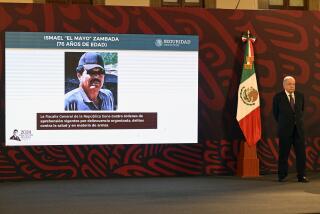Time Bomb : Analysts Say Mexico Was Ripe for Cabal’s Apparent Bank Fraud
- Share via
A Mexican banking fraud like the one alleged this week against high-flying billionaire Carlos Cabal Peniche was all but inevitable because of the rapid growth of the nation’s banking system and the difficulty inherent in supervising it, analysts and banking experts say.
The government of President Carlos Salinas de Gortari made it a top priority to open up, privatize and expand the banking system in a bid to feed the economy’s desperate need for credit, an essential element in enabling businesses to expand and consumers to buy.
As a result, the number of open or authorized banks in Mexico is now at 37--more than double the 18 that were operating in 1991 when the privatization began.
And those banks that in the 1980s were forced to reserve 95% of their assets for the Mexican government’s use in repaying foreign debt now have a green light to do business. As a result, total loans by Mexican banks have nearly doubled to $142 billion in March from $75 billion in late 1991.
Mortgages at Bancomer, Mexico’s second-largest bank, now total $8 billion, up from $1 billion in 1990, despite interest rates of 23% that might seem prohibitive to U.S. borrowers. Still, loan demand remains way ahead of supply, and a balance may not be achieved until 1996, says Susanna Ornelas, a bank analyst with Baring Securities in Mexico City.
The stage is set for still more rapid growth. Forty-one foreign concerns--including such U.S. firms as Bank of America, Ford Motor Credit Co. and Citibank--have applied for licenses to open banks in Mexico. The new players, if admitted, will dramatically expand the range of financial services available to Mexicans.
But rapid growth, as was shown by the U.S. savings and loan debacle of the 1980s, often comes at the expense of bank supervision and loan quality, leading to failures and fraud as banks in their eagerness to lend money take on less than credit-worthy customers.
Some U.S.-based analysts also faulted the link between banks and industrial companies that characterizes Mexico’s grupos , or conglomerates, such as the banking, agricultural, timber and retailing empire at the center of this week’s scandal.
Autoprestamos , or self-loans, were allegedly a principal occupation of Cabal, 38, chairman of Grupo Financiero Union, whom Mexican officials charged Monday with fraudulently loaning as much as $700 million to himself--from his Banco Union and Banca Cremi--to buy stock in other companies.
Cabal is now a fugitive, the target of a worldwide manhunt.
“Whenever you have industrial companies connected with banks, you run the risk of loans being taken into the industrial sector, which is why in the U.S., commercial banks are not allowed to own an industrial concern,” said a Wall Street-based analyst of Latin American banks.
Nonetheless, foreign observers gave Mexico high marks for stepping in at Grupo Financiero Union this week and, in jailing several of Cabal’s lieutenants, sending a tough message.
“Here the Mexican bank authorities look pretty good. We are getting a First World response to a potential crisis, and this can be reassuring to Mexican and U.S. investors, the fact that they moved in and said they weren’t going to allow banks to be viewed as personal piggy banks,” said analyst Peter Treadway of Smith Barney in New York.
But apart from the alleged fraud by Cabal and the government’s seizure of another banking conglomerate--Grupo Havre, for alleged embezzlement earlier this year--Mexico’s banking industry faces its own set of problems. The main one is an economy that hasn’t cooperated. The buyers of the government banks in 1991 were figuring on economic expansion to boost their banks’ performance, which hasn’t occurred.
As a result, bad loans have been rising steadily since privatization began and reached 9.8% of Mexico’s outstanding loans in June. An industrywide average of 10% could presage a step-up in government takeovers, said Jose A. Garcia-Cantera, Latin American bank analyst at Salomon Bros.
Mexican banks are also struggling to install and integrate the technology needed to trace credit quickly and ensure better loan quality.
“The Mexican mortgage market is like the Chinese airlines,” said Treadway. “There’s tremendous demand but not enough people, service and planes. . . . There’s no mortgage loan history. You could default on a house, move next-door, and the bank making the new loan would never know you had defaulted.”
Although privatization of the 18 formerly state-owned banks is well under way, banking experts say enormous power remains concentrated in the hands of bank branch managers, giving them the authority to approve loans that in U.S. banks is usually shared by a loan committee. That process is changing only slowly.
Thus, while the government promised this week that Cabal’s depositors are safe and no other bank scandals are about to surface, observers such as Garcia-Cantera have other worries. He said smaller banks could run into problems unless the economy recovers strongly.
“The situation of asset quality is quite scary,” Garcia-Cantera said. “My concern is not about the ability of the supervisors, but that bank managers are sufficiently conservative in (identifying) bad assets.”
Loans Rising, Defaults Too
The rapid expansion of Mexico’s banking system has not come without costs. Banks are reporting an alarming rise in non-performing loans, a result of the country’s weak economy.
Total outstanding loans held by Mexican banks in U.S. dollars:
March 1994: $142 billion
Percentage of loans past due:
June 94: 9.8%
Source: Salomon Bros.
More to Read
Sign up for Essential California
The most important California stories and recommendations in your inbox every morning.
You may occasionally receive promotional content from the Los Angeles Times.













